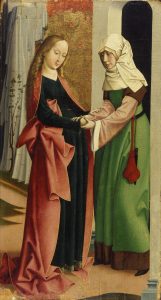Words on the Word
Visitation
Zephaniah 3.14-18: Zion, have no fear, let not your hand fall limp!
Luke 1.39-56: The child in my womb leapt for joy.
There’s a jubilation to Mary’s visitation of Elizabeth.
Mary ‘hurried’ across the mountain quite as Abraham ‘hurried’ when he, at noon in Mamre, received the angels who proclaimed the fulfilment of God’s promise (Genesis 18). Where the Lord is at work, things and interactions are set in movement.
The encounter we read about involves four persons. The two women great with child, one young, the other elderly, embrace. The two unborn children likewise greet each other.
‘The moment your greeting reached my ear, the child in my womb leapt for joy’, says Elizabeth. The word the evangelist uses is the same word we find in a Psalm of David which sings of Israel’s home-coming to Zion. When the Lord led his people home, ‘the mountains leapt like rams, the hills like young lambs.’ That is what we read in the Septuagint, the New Testament’s Old Testament.
The presence of God causes even granite to vibrate.
Let us take note that the first human subject explicitly to acknowledge the incarnation was an embryo.
The scene from that mountain village is historically unique. Yet the story of the encounter is paradigmatic of our circumstances. We receive, here at the altar of the Lord, the Body of Christ. Then we bear him, the Living One (Apocalypse 1.18), into the world.
Are we conscious of being, of being called to be, ambulant tabernacles?
We sometimes wonder how we might best witness to our faith in today’s society. It is not always a multitude of words that is called for. If Christ lives in us he himself will, by his presence, accomplish his work of blessing, exhortation, and healing. Reality, meeting him, will constitutionally leap for joy.
Our principal concern must be to resist every sin that threatens to suffocate his life in us. Francis of Sales had a phrase he used to tell people, and used as a heading for most correspondence: Vive Jésus! – ‘Let Jesus live!’
If we fix that phrase as our rule of live, and let God’s Word abide in us richly (Colossians 3.16), we shall witness to the Gospel whether we speak or keep silence, wake or sleep, live or die.
Amen.

The Visitation, a painting attributed to Rueland Frueauf the Elder (c. 1445 – 1507), previously attributed to Bartholomäus Zeitblom (1450 – 1521). In the Harvard Art Museums.
